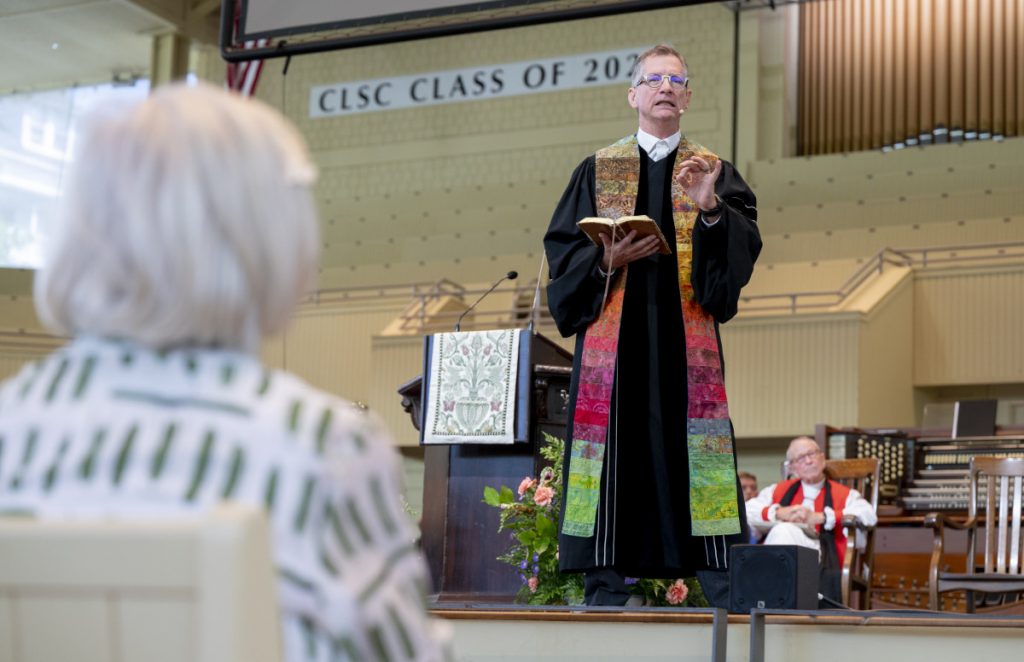MARY LEE TALBOT – STAFF WRITER

“Today’s sermon will be a challenge, trying to put a master’s level course into 10 minutes. This sermon will be hardest to hear if you are white,” said the Rev. John C. Dorhauer at the 9 a.m. Aug. 25 service of worship in the Amphitheater. His sermon title was “The Wound Healed Lightly,” and the Scripture text was Jeremiah 6:13-15.
“The wound that has healed lightly is racism,” Dorhauer said. “It has existed since white Europeans landed here, and it has never gone away, and we fool ourselves if we think it is gone.”
This is not an individual wound to one body, Dorhauer said, but a wound borne by an entire people. In The Wounded Heart of God, author Andrew Park discussed “han,” a Korean concept of a soul, psyche and body borne by people living under an oppressor.
In the Scripture reading, Jeremiah was not talking to the wounded, but to the wounders who think that life is good. “They are wealthy and powerful and have a theological belief that they are this way because God loves them and blesses them. This kind of theology is still around,” Dorhauer said.
Jeremiah was sent to the affluent people who could not see the wounds they were inflicting on the people around them. Jeremiah said if their prophets cried “peace, peace” when there was no peace, judgment would come.
“The judgment is that God allows us to bear the consequences of our bad and cruel behavior,” Dorhauer said.
Dorhauer recommended the book Four Hundred Souls, edited by Kiesha N. Blain, Wednesday’s morning lecturer.
“I had no idea nine months ago — when I began to put this sermon series together — that she would be the next speaker on this platform,” he said. “Her book is the history of the lived experience of brown bodies in five-year increments since the first 400 people were brought here. It shows the wounding that continues and the way people carry the physical, psychic and existential wounds of racism.”
He acknowledged that many people in the congregation who are white are activists against racism and worked in the civil rights movement. He said, “We have this sense that we did it, we marched and went to jail and risked our lives and with the Civil Rights Act of 1965 and the Fair Housing Act of 1968 it was accomplished. But this is equal to Jeremiah calling out the prophets who said ‘peace, peace,’ when there is no peace.”
Dorhauer continued, “Things seemed to get better and then Barack Obama was elected. We thought we had reached the pinnacle and we had resolved racism. Yet during his tenure, the most vile and cruel racial incidents started to creep out, and culminated in the events of Jan. 6, 2021.”
He continued, “I have a sermon I preach about Isaiah’s vision of the peaceable kingdom, the lamb lying down with the lion. I always think the experience of the lamb is different from that of the lion. For the lamb to be at peace, the lion had to give up teeth, claws, muscles, power and the memory of power. The metaphor is that whites have lived in this land with a sense of superiority, and we are going to have to give up our teeth and claws — and give up the system of white supremacy.”
Dorhauer said he has taken his life’s journey to understand racism at a deeper level. He undertakes that journey every day, but still ends up hurting people unintentionally.
“We want to move away quickly from racism without confronting what still remains,” he said. “If white people don’t resolve to give up privilege, the lion and lamb will lie together in a pool of blood.”
He called Jan. 6 the tip of the iceberg and invited the congregation to dig deeper, to heal wounds even though there is still a long way to go. He offered two suggestions. First, on the creative pathway to racial equity, white people are allies on the journey — not the leaders.
“This is not ours to resolve, because we will never go the full distance,” he said. “We don’t drive the bus — we are riders on the bus, and we need to commit to stay.”
The second suggestion was to accept the invitation from Jeremiah; to side with the God who shows no partiality.
“We make a mistake when we think the only people wounded are people of color,” Dorhauer told the congregation. “If we believe the lie that we can reap the benefits of being white without interrogating that belief, then we carry a wound. We have to commit to healing the wound, no matter what it takes.”
The Rev. David Shirey presided. Paul Burkhardt, a 50-year member of the Motet and Chautauqua Choirs, read the Scripture. Joshua Stafford, Jared Jacobsen Chair for the Organist and director of sacred music, played “Berceuse” and “Carillon” from “24 Pieces Pieces in Free Style” by Louis Vierne, for the prelude and postlude. Members of the Motet Choir sang “There is a Balm in Gilead,” arranged by William Dawson to words from Jeremiah 8:22 and a traditional spiritual. This week’s services and chaplain are supported by the Daney-Holden Chaplaincy Fund.




